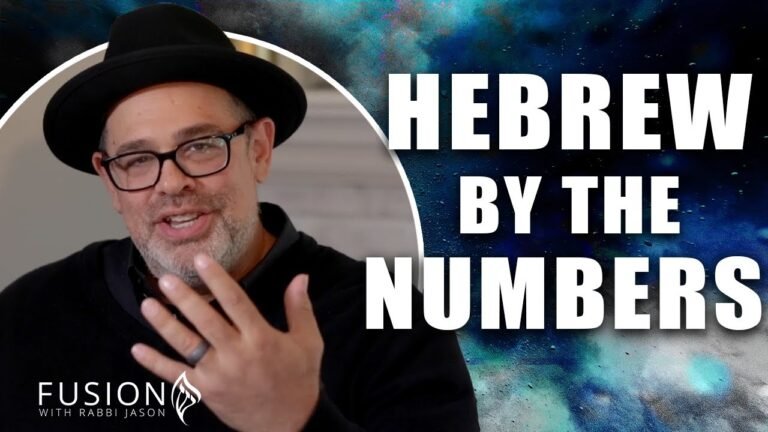The Hebrew Significance of Numbers Explained
The Hebrew significance of numbers is a captivating exploration of how numerical values intertwine with spiritual and cultural meanings in Jewish tradition. From the mystical teachings of Kabbalah to the symbolism found in ancient texts, each number carries profound implications that transcend mere arithmetic. Understanding these numerical interpretations not only enriches one’s knowledge of Hebrew culture but also provides a deeper insight into the values and beliefs that have shaped Jewish identity throughout history. As we delve into this intriguing subject, we uncover the layers of meaning that numbers hold, revealing a world where mathematics and spirituality converge.
What do numbers represent spiritually in Hebrew?
In Jewish tradition, numbers hold profound spiritual significance, serving as a bridge between the material world and the divine. This belief is deeply rooted in historical study, where each numeral is seen as a key to understanding God’s will and the universe. The culmination of this understanding can be observed in the construction of the Tabernacle, where every numerical detail reflects a deeper spiritual reality, embodying a sacred connection to the cosmos.
The dimensions of the Tabernacle are not merely architectural; they symbolize a “microcosm of creation.” This intricate design illustrates how God utilized numerical principles to manifest the Olamot, or Universes. Thus, the study of numbers in Hebrew tradition transcends mere mathematics, inviting believers to explore the divine blueprint that underpins existence and to find meaning in the sacred numbers that shape their spiritual journey.
How are numbers understood in Hebrew culture?
In Hebrew, numbers are expressed through a unique system that utilizes the alphabet rather than the Arabic numerals commonly found today. Each letter in the Hebrew alphabet corresponds to a numerical value, allowing for a rich interplay between language and mathematics. This method not only serves as a means of quantification but also carries cultural and historical significance, reflecting the language’s ancient roots.
Furthermore, specific terms are employed to articulate larger quantities, enhancing clarity and understanding. For instance, “ma’ah” signifies 100 and “elef” denotes 1,000, illustrating how the Hebrew language encapsulates numerical concepts within its lexicon. This distinctive approach offers a fascinating glimpse into the interplay between language, culture, and mathematics in Hebrew tradition.
What is the significance of the number 7 in Hebrew?
In Hebrew culture, the number seven holds significant symbolic meaning, representing a sense of fullness or completeness. The linguistic connection is evident, as the word for “seven” (שבע) shares the same consonantal roots as the word for “complete” or “full” (שבע). This inherent relationship underscores the importance of the number in ancient Near Eastern and Israelite literature.
The prominence of seven is reflected throughout biblical narratives, where patterns involving this number frequently appear. From the seven days of creation to the seven-year cycles of rest, these instances illustrate a deep-seated belief in the concept of wholeness. As a result, the number seven serves as a powerful symbol, enriching the spiritual and cultural fabric of Hebrew tradition.
Unraveling the Mystical Meanings Behind Hebrew Numerology
Hebrew numerology, or Gematria, presents a fascinating lens through which to explore the mystical significance of numbers in the Hebrew language. Each letter in the Hebrew alphabet corresponds to a numerical value, allowing for a rich tapestry of interpretations when words and phrases are analyzed. This ancient system reveals hidden connections between seemingly unrelated concepts, embodying the belief that numbers carry divine and spiritual wisdom that transcends mere arithmetic.
At its core, Hebrew numerology emphasizes the interconnectedness of language and spirituality. By examining the numerical values of words, practitioners can uncover deeper meanings and insights that might not be immediately apparent. For instance, the word “chai,” meaning life, has a numerical value of 18, which has led to its symbolic association with good fortune and blessings in Jewish culture. This profound relationship between words and their numerical counterparts invites individuals to reflect on the layers of meaning embedded in their everyday language.
As curiosity about numerology grows, many are turning to Hebrew Gematria to seek guidance and understanding in their lives. Whether through personal reflection, spiritual practices, or even the exploration of historical texts, this mystical approach encourages individuals to embrace the wisdom hidden within numbers. By unraveling these meanings, one may find not only a deeper connection to their heritage but also a pathway to greater self-awareness and enlightenment.
Discover the Spiritual Insights Hidden in Hebrew Numbers
Hebrew numbers carry profound spiritual significance, offering insights that extend beyond mere numerical value. Each number is intertwined with rich symbolism, connecting to the essence of creation, divine attributes, and the human experience. For instance, the number seven symbolizes completion and rest, reflecting the divine creation of the world in six days followed by a day of rest. This connection invites us to ponder our own cycles of work and renewal, encouraging mindfulness about our spiritual journey.
Delving deeper into these numeric symbols reveals a tapestry of wisdom that can enrich our understanding of life’s mysteries. The number ten, representing divine order and completion, invites contemplation on the structure of our lives and the laws that govern our existence. By exploring these hidden meanings, we can uncover a deeper awareness of our purpose and the interconnectedness of all things. Engaging with Hebrew numbers not only enhances our spiritual practice but also fosters a greater appreciation for the divine patterns that shape our world.
A Journey Through Numbers: Their Hebrew Interpretations
In the realm of Hebrew tradition, numbers transcend mere arithmetic; they embody profound spiritual significance. Each numeral unfolds a rich tapestry of meanings, steeped in history and culture. For instance, the number seven is revered as a symbol of completion and divine perfection, deeply embedded in the creation narrative and the weekly cycle of rest. This sacred essence invites individuals to explore the deeper implications of numbers in their own lives, encouraging a reflective journey toward understanding.
As we delve deeper into the numerical landscape, the number eighteen emerges as another powerful figure, representing life itself. In Hebrew, the word for life is “chai,” which corresponds to the numerical value of eighteen. This connection is celebrated in various customs, such as charitable donations in multiples of eighteen, embodying the hope and vitality that life brings. By acknowledging these numerical interpretations, individuals can cultivate a more profound appreciation for the vibrancy of existence and the interconnectedness of all things.
The exploration of numbers in Hebrew culture reveals a captivating interplay between mathematics and spirituality, inviting us to reconsider our perceptions of both. Each digit serves as a key to unlocking deeper philosophical insights and personal growth, urging us to recognize the patterns that govern our lives. As we continue this journey through numbers, we find not just calculations but also a rich source of wisdom, guiding us toward a more meaningful existence.
The Power of Numbers: Exploring Hebrew Symbolism and Significance
Numbers hold a profound significance in Hebrew culture, serving as a bridge between the earthly and the divine. Each numeral is imbued with layers of meaning, often connecting to ancient texts and spiritual teachings. For instance, the number seven symbolizes completion and divine perfection, as seen in the seven days of creation. This rich tapestry of numerical symbolism invites individuals to delve deeper into the spiritual narratives woven throughout history.
In addition to their spiritual implications, Hebrew numbers also play a decisivo role in the language itself. The numerical values assigned to each letter in the Hebrew alphabet create a system known as gematria, where words can be analyzed for hidden meanings based on their numerical equivalents. This practice not only enhances the understanding of sacred texts but also reveals intricate connections between seemingly unrelated concepts, enriching the study of Jewish philosophy and theology.
Ultimately, the exploration of Hebrew numbers transcends mere mathematics; it is an invitation to engage with a deeper wisdom that permeates the culture. By interpreting numbers through the lens of symbolism and significance, individuals can unlock insights into their own lives and the world around them. Embracing this knowledge fosters a greater appreciation for the heritage and spiritual depth of Hebrew tradition, encouraging a lifelong journey of discovery and understanding.
The Hebrew significance of numbers transcends mere mathematics, weaving a rich tapestry of spiritual and cultural meaning. Each number embodies unique attributes, offering insights into the divine and humanity’s place within it. By exploring these numerical connections, we can deepen our understanding of ancient wisdom and its relevance in today’s world, illuminating pathways to personal growth and spiritual awakening. Embracing the profound messages hidden within these numbers invites us to reflect on our own journeys and the interconnectedness of all things.







